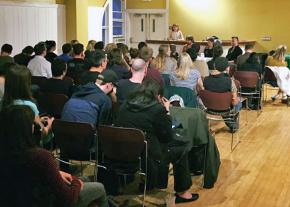Ready for May Day in San Francisco
reports on a panel discussion that highlighted upcoming May Day protests and connected the fights for immigrant rights, labor rights and socialism.
AS MAY Day--International Workers Day--draws near, activists are preparing for demonstrations in cities across the country to stand up in defense of immigrant and workers' rights against the attacks of the Trump administration.
On April 19, socialists gathered in San Francisco for a panel discussion focusing on the radical history of May Day--and arguing why socialists, trade unionists and immigrant workers and their supporters should participate in this working-class tradition. Approximately 60 people attended the forum, which was sponsored jointly by Bay Area chapters of the International Socialist Organization (ISO), Democratic Socialists of America (DSA) and Socialist Alternative (SA). Some members of the Tech Workers Coalition--a progressive group of tech industry workers and labor and community organizers--joined others in attending.
Highlighting the importance of May Day and the increasing popularity of socialist ideas, panelists invited everyone in the audience to build a socialist contingent planned for the May 1 "Day Without Immigrants" march in San Francisco.

ISO MEMBER and SocialistWorker.org contributor Alex Schmaus spoke about the history of May Day as a tradition with its roots in the one of the first nationwide struggles of the U.S. working class at the end of the 19th century.
International Workers Day on May 1 commemorates the 1886 mass strike for the eight-hour day as well as the Haymarket Martyrs--a group of anarchist labor organizers in Chicago who were tried, convicted and several executed on trumped-up charges of being responsible for a bombing in Chicago's Haymarket Square.
The struggle for the for the eight-hour day was at the center of a radicalization and mobilization of the working class--a historical example that Schmaus described as illustrating how "one of the best ways to build the organizational capacity of the left is to strike."
Erin Brightwell of SA connected the history of May Day to present conditions. She argued that the left can't cooperate with the Trump administration in any way; that we need to build movements in the streets; and that our actions should be developing the confidence of these movements, and not isolating the left from other forces. "This summer, we must organize against Trump and the billionaire class," Brightwell concluded.
Speaking about the radical history of the left in San Francisco, Ryan Moore of DSA said: "When people stand up for each other and themselves, regardless of whether they are victorious, the process of struggle and solidarity can be transformative." Moore also said that that we should put the "social back in socialism" and hold more events like the panel discussion to strengthen relationships on the left.
All of the speakers pointed to the importance of the immigrant rights movement and how the traditions of May Day were brought back to the U.S. by the mass "Day Without Immigrants" marches in 2006, when hundreds of thousands took to the streets against reactionary legislation to criminalize the undocumented. With immigrants under attack by the Trump administration, the fight for immigrant and refugee rights are particularly important at this year's May Day events.
One audience member echoed this sentiment, pointing out that refugees and immigrants are being targeted not only by Trump, but by the right in general--but that there is strong solidarity as well, as evidenced by one of the most popular chants at the Women's March in San Francisco on January 21: "No borders, no nations. Stop deportations!"
Next up for socialists in San Francisco is a picnic gathering on April 30, followed by flyering for the socialist contingent in the march the next day--and then May Day itself. The socialist contingent initiated by ISO, DSA and SA will gather at Justin Herman Plaza and march together.


